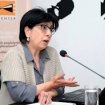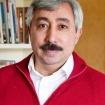“The Role of External Factors in the Karabakh Process - 2018: Mediators, Regional Actors and International Organizations”: Page 3 of 8
be viewed as a warning that such a scenario may be employed. At that, not only in case Azerbaijan attempts to impose a military solution of the problem. In fact, he underlines very specifically that President Ilham Aliyev is entitled to represent all the citizens of Azerbaijan at the negotiations, including those who used to reside in Shushi or Kerkejan; whereas he himself does not have a right to act on behalf of the Armenians in Artsakh – the population of Artsakh is not his electorate and have not granted him with such an authority.
Rauf Mirkadyrov - I would believe in the pacifism of my opponents if they pointed, with similar consistency, at the need to liberate all the occupied territories around Nagorno Karabakh and ensure the return of the displaced persons to their permanent residences. Naturally, after the provision of international guarantees of safety for the Armenians in Nagorno Karabakh because in the present manner it is just “profitable” pacifism. In simpler terms, it is propaganda. Moreover, this makes an impression that Armenians are all so very peaceful and gentle, while Azerbaijanis are war-loving barbarians. Finally, the protection of sovereignty and territorial integration are not just norms of the international law, but also an obligation assumed by every government before its people. That is why no government can proclaim refusal from the military scenario of liberating occupied territories in a situation when 24-year peace negotiations have not yielded any fruit.
By the way, it is not an established fact that large-scale military activities will be launched.
On the Probability of “Coercion to Peace” in Case of a War
Rauf Mirkadyrov - It should be mentioned right away that the so-called “Collective West” as a whole cannot in any way hinder the resolution of this conflict after the military scenario, especially if we mean temporal restrictions. The “collective West” - NATO in general, and such leading states as the USA in particular – do not have a military presence in our region, and as a consequence to this, do not avail of tools for “coercing peace” over the parties of the conflict. On the one hand, this is an extremely negative factor, for the very simple reason that in the region there is no military and political balance established by the leading global players, and primarily between Russia and the USA. However, the lack of a military and political presence removes any liability for any probable development after the military scenario from the West in general, and the USA in particular. That is why the West could “turn a blind eye” to the attempts of the military resolution of the conflict, if actions are short-term and do not go along with criminal acts against the peaceful population. Many diplomats representing the leading Western states in Baku have made many explicit references to this point in private conservations with the author of these lines.
Thus, from among the leading geopolitical players only Russia has a military and political presence in the region, hence, “the tools for peace coercion” onto the parties of







 +37410 563363
+37410 563363
 1/3 Buzand Str, 8 Floor, Yerevan, Armenia
1/3 Buzand Str, 8 Floor, Yerevan, Armenia